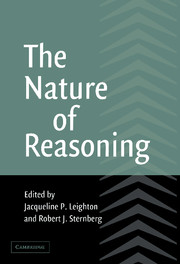Book contents
- Frontmatter
- Contents
- List of Contributors
- PART ONE THE BASICS OF REASONING
- PART TWO THE WORKINGS OF REASONING
- PART THREE THE BASES OF REASONING
- 11 The Assessment of Logical Reasoning
- 12 The Development of Deductive Reasoning
- 13 The Evolution of Reasoning
- 14 Individual Differences in Thinking, Reasoning, and Decision Making
- 15 Teaching Reasoning
- 16 What do We Know about the Nature of Reasoning?
- Index
13 - The Evolution of Reasoning
Published online by Cambridge University Press: 05 July 2011
- Frontmatter
- Contents
- List of Contributors
- PART ONE THE BASICS OF REASONING
- PART TWO THE WORKINGS OF REASONING
- PART THREE THE BASES OF REASONING
- 11 The Assessment of Logical Reasoning
- 12 The Development of Deductive Reasoning
- 13 The Evolution of Reasoning
- 14 Individual Differences in Thinking, Reasoning, and Decision Making
- 15 Teaching Reasoning
- 16 What do We Know about the Nature of Reasoning?
- Index
Summary
Cognition is a biological function, not a cultural invention. Our nervous systems detect, encode, and process information, not because someone invented these capacities in antiquity, but because evolutionary forces shaped the organs that instantiate these biological functions. Cognition is the function that ensures a nonarbitrary relation between perception and action. Historically, psychologists have tended to overlook or downplay the role of biology and evolution when developing theories of cognitive functions, with the inevitable result that our theories have often provided inadequate predictions and explanations of cognitive phenomena, from basic inductive processes to higher cognition.
EVOLUTION AND BASIC INDUCTIVE PROCESSES
Consider first investigations of spatial learning in the rat. In one standard paradigm, a rat is placed on a central platform with alleys radiating out from the platform like spokes in a wheel. A cache of food is placed at the end of one of the alleys. The maze is constructed such that the rat cannot see the ends of the alleys, and air flow is directed such that no olfactory cues are present to guide the rat to the food. The rat is allowed to explore the maze. After it has found and consumed the food, the rat is removed and placed again on the platform, and the same alley rebaited. What will the rat do now?
- Type
- Chapter
- Information
- The Nature of Reasoning , pp. 339 - 374Publisher: Cambridge University PressPrint publication year: 2003
- 3
- Cited by



